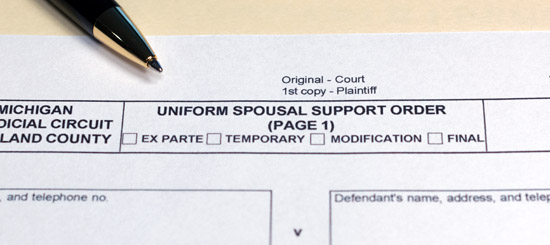Michigan Spousal Support and Alimony
Michigan is a “no-fault” divorce state. The “no-fault” designation applies to the ability to obtain a divorce. In other words, a couple may get a divorce in Michigan without proving one of them did something wrong. Couples must state that there has been a breakdown of the marriage and there’s no reasonable likelihood that you and your spouse will get back together Mich. Comp. Laws 552.6 (2019). Even though fault may not be assigned in regards to the actual ability to obtain a divorce, some judges may consider fault when deciding spousal support or alimony payments.
Types of Spousal Support and Alimony
Spousal support and alimony payments basically mean the same thing. Michigan offers four types of spousal support:
- Temporary – As the name implies, this kind of support does not last forever. An example would be one party making the house payment and paying utility bills while the divorce process is on-going. This may end when the divorce is final. However, some temporary payments may continue after the divorce is final when there is a large discrepancy in income. In other words, if one spouse has a very large income and the other one does not, a judge may write a new order to cover costs for long term assistance.
- Periodic – This time of financial assistance may be granted to allow one spouse to obtain education or training. Perhaps, one spouse was out of the workforce to raise children, or care for elderly parents. During this time, the other spouse was free to build a career, or go to college. The Judge may grant a periodic support order to assist the spouse that needs help to become independent.
- Permanent Support – This type of support may be granted in cases where there is no prenuptial agreement and one party requires financial assistance. Many times these are long term marriages, or situations where there is considerable wealth.
- Lump Sum Payment – In this situation, one spouse agrees to accept property, retirement benefits, cash, stock, or other monetary goods as a one-time payment. This is a rare occurrence.
How Spousal Support is Determined

The party who files for the divorce is known as the plaintiff, and this person cannot state any other reason than the above requirement as a grounds for a divorce. The plaintiff cannot provide anymore detail of why they are requesting the divorce. The defendant is the other spouse, and this party may either admit or deny the allegations of the plaintiff. Even if the defendant admits to the plaintiff’s claim, a divorce judgment in Michigan may not be entered until evidence is presented in open court that there has been a breakdown in the marriage relationship. A divorce ends a valid marriage in Michigan.
For a court to issue a Michigan divorce judgment, it must have jurisdiction over the two parties, and the residency requirements must be met, which are listed in MCL 552.9(1), which states,
(1) A judgment of divorce shall not be granted by a court in this state in an action for divorce unless the complainant or defendant has resided in this state for 180 days immediately preceding the filing of the complaint and, except as otherwise provided in subsection (2), the complainant or defendant has resided in the county in which the complaint is filed for 10 days immediately preceding the filing of the complaint.
(2) A person may file a complaint for divorce in any county in the state without meeting the 10-day requirement set forth in subsection (1) if all of the following apply and are set forth in the complaint:
(a) The defendant was born in, or is a citizen of, a country other than the United States of America.
(b) The parties to the divorce action have a minor child or children.
(c) There is information that would allow the court to reasonably conclude that the minor child or children are at risk of being taken out of the United States of America and retained in another country by the defendant.
Factors Judges Consider
Alimony decisions are more complicated than calculating child support payments. The decisions are more complex because child support relies on a mathematical formula based on income. Alimony must look at many more factors including:
- Length of the marriage
- Age of the couple
- Health of the parties
- Assets involved
- Previous standard of living
- Did one spouse contribute to the divorce, or hide assets
- Property
- Ability to pay
How Can a Divorce Attorney Help?
The divorce process is an emotional roller-coaster. During this anxiety laden time it remains important to seek an objective, experienced attorney to guide you through the process. Your lawyer will file necessary paperwork in a timely manner and make sure you are aware of all your assets. This is particularly important if one spouse handles financial matters and the other spouse lacks access to accounts.
An experienced divorce lawyer will explain how Michigan’s laws affect you. More importantly, your attorney will protect your rights. Remember, this is not something you want to do on your own. Also, it is not advisable to “share” an attorney with your soon to be ex-spouse. In conclusion, hire an experienced family law attorney that specializes in divorce.




